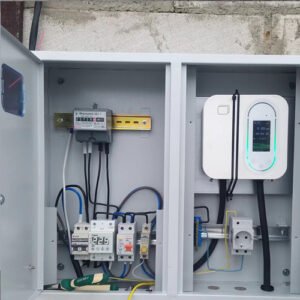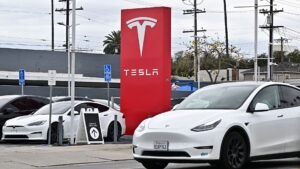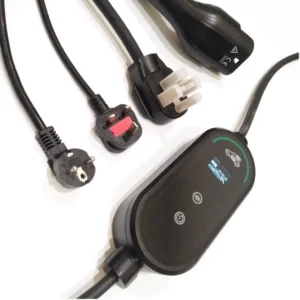Types of electric vehicle chargers
Electric vehicle charger Type 1

Type 1 electric vehicle charger is mainly used for some early-production cars in Asia and North America. It adopts a five-pin design and uses the SAE J1772 standard.
The type 1 electric vehicle charger uses 5 contacts to achieve charging, which are: two current contacts, one ground contact, and one proximity detection contact. These 5 contacts work together to ensure that charging only occurs when the vehicle is not running.
Electric vehicle charger Type 2

It can be regarded as an upgraded version of the type 1 electric vehicle charger, because it is not only upgraded to 7 pins, but also uses AC for charging. This means that its charging speed is much faster than the type 1 electric charger (the charging speed varies depending on the output power).
Common 7kW and 22kW electric vehicle chargers are type 2 electric vehicle chargers. Currently, they are widely used in China and the UK.
Electric vehicle charger Type 3

It has the fastest charging speed and is known as the “super charger”. Unlike type 1 and type 2 electric vehicle chargers, it uses direct current for charging, so its charging speed is much faster than type 1 and type 2 electric vehicle chargers.
EV charging type 1 vs type 2: Detailed comparison
Design
Type 1 electric vehicle chargers are usually round interfaces with 5 round holes. Type 2 electric vehicle chargers are composed of rounded corners and semicircles with 7 round holes. There is a clear difference in appearance between the two.
Output power
Type 1 electric vehicle chargers use single-phase power supply and can only output power below 7.4kW. In comparison, the output power of type 2 electric vehicle chargers is much faster. It can output power below 22kw, which is about three times faster than the type 1 charger, which can only output 7.4kw at most.
Driving range
If you use a Type 1 EV charger, you can travel up to 15 km per hour (assessed at a maximum charging speed of 7.4 kwh), while with a Type 2 EV charger, you can travel up to 45 km per hour (assessed at a maximum charging speed of 22 kwh).
Cost
The cost of using a Type 1 charger is extremely low, and you can charge it with regular household appliances after purchase. Choosing a Type 2 charger has certain requirements for the circuit. If you want to achieve the maximum output power, you may need to install an additional three-phase power supply, and the construction cost is also slightly higher.
Application scenarios
Type 1 EV chargers are very suitable for home use, while Type 2 EV chargers are more suitable for commercial, workplace, shopping areas and other places.
Does my electric car use a Type 1 or Type 2 charger?
We have 2 ways to get which type of charger an electric car uses.
The first one: We can observe the charging port of the electric vehicle, because we have learned from the above article that if a type 2 charger is used, then 7 small round holes should be seen in the electric vehicle. On the contrary, if we see 5 small round holes, it means that a type 1 electric vehicle charger is used.
The second one: We can check it from the user manual of the electric vehicle. If you can’t find it, you can also contact us and we will assist you in the inquiry.
Electric vehicle charger type 1 vs type 2: How to choose?
First of all, we need to make sure that our electric vehicle supports type 2 chargers. Secondly, from various factors, it is obvious that type 2 chargers have an overwhelming advantage. Unless the electric vehicle does not support it, my suggestion is to directly choose type 2 electric vehicle chargers.








